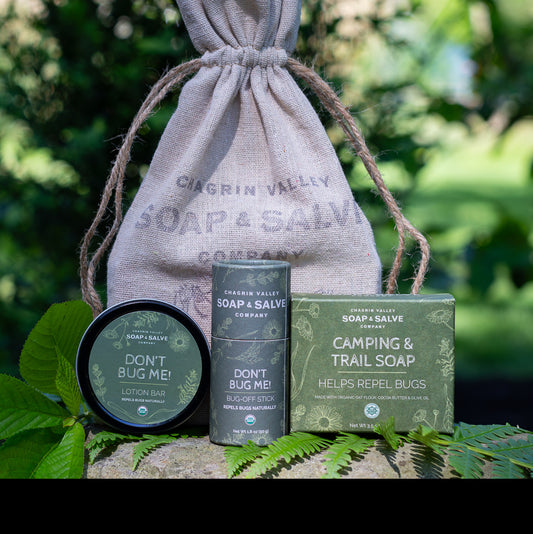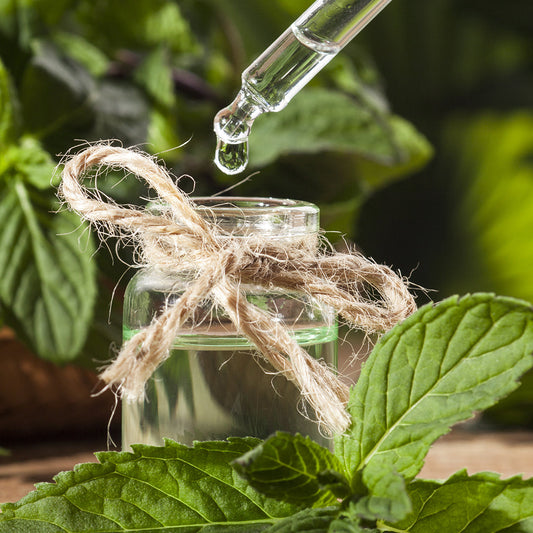Harnessing The Power of Plants in Natural Insect Repellents
We Work With Nature . . . Not Against it!
Obviously, the whole idea behind the ingredients in an insect repellent is to make us as unappealing to bugs as possible.
After the long Cleveland winter, I can’t wait to get outdoors to resume picnics, gardening, and walks in the woods. But with warm weather comes pesky biting bugs!
My skin is very sensitive to synthetic chemicals and I have never been able to use conventional bug repellents.
The irritation from the repellent is more of a problem for me than the itching from bug bites. That being said, I don’t live in an area where bug bites usually lead to serious diseases.
Mosquito Season
 Mosquito season has already begun in most parts of the country.
Mosquito season has already begun in most parts of the country.
Generally, when temperatures no longer dip below 50°F (10°C), mosquito eggs begin hatching and the mosquito season begins. In southern Texas and Florida, this may be as early as February.
Mosquitoes thrive in hot weather and as the summer temperatures increase, the mosquito breeding cycle time shortens meaning even more mosquitoes.
The mosquito season reaches its peak during the hot summer months.
Who Regulates Skin Applied Insect Repellents?
Since many over-the-counter insect repellents contain pesticides, they are regulated by the Environmental Protection Agency (EPA). You will see an EPA Registration Number on the product label of any EPA-registered insect repellent. EPA registration of skin-applied repellent products indicates that they have been "evaluated and approved for human safety and effectiveness when applied according to instructions on the label." (source: www.epa.gov)
Some insect repellent products for sale in the United States do not require EPA registration. These bug repellents are those made using what the EPA calls “biochemical pesticides.” Biochemical pesticides are naturally occurring substances derived from plants, animals, and other natural materials that control pests by non-toxic mechanisms.
Conventional pesticides, by contrast, are generally synthetic materials that directly kill or inactivate the insects. Biochemical pesticides include essential oils like lemon eucalyptus and citronella. (source: www.epa.gov)
Although the EPA has evaluated the biochemical active ingredients in natural products, like Chagrin Valley’s natural organic bug repellents, for safety, products made from these ingredients have not been evaluated for effectiveness.
Ingredients Can Be Natural or Synthetic
The most popular active ingredient in conventional repellents is DEET (N,N-Diethyl-m-toluamide).
 While there is no argument that DEET is an effective insect repellent, there is a lot of disagreement concerning its safety.
While there is no argument that DEET is an effective insect repellent, there is a lot of disagreement concerning its safety.
While many people use DEET-based products without any problems, others have suffered side-effects ranging from rashes and hives to neurological problems. DEET is absorbed through the skin into the bloodstream and absorption continues as long as the product remains on the skin. DEET is stored in your skin, body, fat and your central nervous system. Children are especially susceptible to the adverse effects of DEET.
There are negative environmental impacts as well. DEET is a contaminant that breaks down slowly in soil.
A U.S. Geological Survey report listed DEET as one of the contaminants most frequently found in our nation’s streams. It is toxic to birds, fish, and aquatic life. When DEET is sprayed, it remains as a mist in the air where it persists until it breaks down in the atmosphere.
The So-Called "More Natural" Insect Repellents
As consumers demand products that are natural, organic and environmentally friendly, large corporations jumped on the bandwagon to create a more natural bug repellent.
The ingredients for one such "more natural" insect repellent are shown below:
-
Active Ingredients: p-Menthane-3,8-Diol: while this ingredient occurs naturally in the lemon eucalyptus plant, for commercial use, it is chemically synthesized. It is used in bug repellent products.
-
Other Ingredients:
-
Petroleum Distillate: Solubilizer: Helps ensure even distribution of a product's ingredients. The Consumer Product Safety Commission says the toxicity of petroleum distillates (PDs) and other hydrocarbons can affect the respiratory system, can affect the nervous system and cause a headache, dizziness, nausea, and loss of balance and coordination. They can also affect the liver and kidneys and can also be absorbed through the skin.
-
Vegetable Oil: Emollient: Softens or smoothes the skin. They don't say which oil--could be from GMO's
-
Almond Oil: Emollient: Softens or smoothes the skin.
-
Diisopropyl Adipate: Emollient: Softens or smoothes the skin. A synthetic compound.
-
Aloe Vera: Emollient: Softens or smoothes the skin.
- Fragrance: Adds scent to a product. Although companies that manufacture personal care products are required by law to list ingredients, fragrances are considered trade-secrets and are exempt. So, the word "fragrance" tells you nothing about the actual ingredients. More than 95 percent of the chemicals in synthetic fragrances are derived from petrochemicals. Exposure to synthetic fragrances can exacerbate health conditions such as asthma, allergies, migraines and chronic lung disease. Our skin, the largest organ in the human body, soaks up many of the toxins present in these synthetic fragrances. These compounds also cause or exacerbate skin problems.
-
Petroleum Distillate: Solubilizer: Helps ensure even distribution of a product's ingredients. The Consumer Product Safety Commission says the toxicity of petroleum distillates (PDs) and other hydrocarbons can affect the respiratory system, can affect the nervous system and cause a headache, dizziness, nausea, and loss of balance and coordination. They can also affect the liver and kidneys and can also be absorbed through the skin.
Whether negative claims about conventional insect repellents are completely true or not, the problem is . . . we just don’t know how long-term use will affect us, our children and our environment!
If you live, hike or camp in areas that do not have a high risk for bug-borne diseases, natural bug and insect repellents can offer good protection.
There is a Better Way!
 Obviously, the whole idea behind the ingredients in an insect repellent is to make folks as unappealing to bugs as possible.
Obviously, the whole idea behind the ingredients in an insect repellent is to make folks as unappealing to bugs as possible.
There are natural alternatives to chemical-laden insect repellents.
Plants have been repelling insects and bugs to protect themselves since the beginning of time.
So why not harness the power of plants?
That’s just what we did at Chagrin Valley. We created a line of safe and effective “Don’t Bug Me!” organic products that would help repel insects—Naturally!
There is clinical research showing that you can minimize bug bites with the natural repellents present in plant essential oils.
The oil of lemon eucalyptus appears to be the most effective. Studies have shown that products containing oil of lemon eucalyptus were more effective than products with lower concentrations of DEET. The Centers for Disease Control and Prevention (CDC) even recommends oil of lemon eucalyptus as an alternative to DEET.
A quick note here. Lemon Eucalyptus Essential Oil is not the same as Oil of Lemon Eucalyptus (OLE). Lemon eucalyptus is an essential oil distilled from the leaves of the lemon eucalyptus tree. It has many different chemical components, including the major component citronellal. OLE is an extract from the leaves of the lemon eucalyptus tree which is refined to increase the content of PMD (p-menthane 3,8-diol), a powerful repellent. Although lemon eucalyptus essential oil is a mosquito deterrent, it is mainly citronellal with a small variable amount of PMD and is not approved for use in areas at high risk for bug-borne diseases. Oil of lemon eucalyptus is mainly PMD, which provides highly effective mosquito protection, and is approved for use in all disease areas.
Since all plants produce their own natural pesticides as a chemical defense, our natural, organic insect repellents work because the active ingredients are those plant essential oils known to contain high levels of natural bug deterrents.
Our special blend of essential oils in our organic bug repellents includes Lemon Eucalyptus, Cedarwood, Citronella, Lavender, Rosemary, Lemongrass, Basil, and Thyme.
Areas At High Risk for Bug-borne Diseases
As you read about our natural bug repellents, please note that if you are looking for long-lasting protection in severe conditions, such as venturing into areas that are heavily infested with mosquitoes and ticks that carry disease, like Malaria or the Zika virus, DEET is still recommended as the most effective.
 The CDC website has numerous pages of information concerning insect-borne diseases, the most effective insect repellents, and travel precautions.
The CDC website has numerous pages of information concerning insect-borne diseases, the most effective insect repellents, and travel precautions.
What Makes Us Different, Makes Us Better!
As with all of our products, I feel great about our ingredients. Our “Don’t Bug Me!” products feel great on your skin, are 100% natural, USDA Certified Organic, and can be used by the whole family.
The concentration of essential oils is stronger in our natural bug repellents. While they are still at skin-safe levels, for very young children or those with very sensitive skin we recommend an allergy patch test.
Keep in mind that a natural insect repellent will need to be applied more often than conventional repellents.
Check out our complete line of Organic Bug Repellents.
Watch our short video of Ida speaking about Chagrin Valleys Natural Bug Repellents.
Have you ever used a Natural Bug Repellent? Do you have any special tips for staying bug-bite-free during the Summer months?








